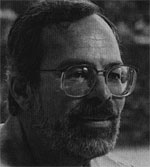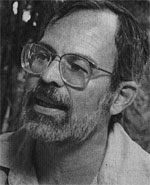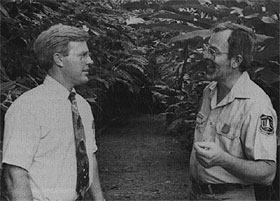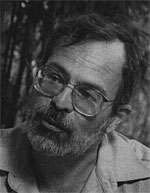Interview: Ariel Lugo

In 1989, Hurricane Hugo pounded Puerto Rico, but El Yunque, the island's grandest mountain, steered the eye of the storm back out to sea, saving the city of San Juan and its million citizens. The feat reinforced El Yunque's status as Puerto Rico's sacred mountain. El Yunque is also the location of the Caribbean National Forest, the only tropical forest in the U.S. National Forest System and an important research destination for tropical ecologists. Scientists know the forest as the Luquillo Experimental Forest. We traveled to Puerto Rico to meet Ariel Lugo, director of the Institute of Tropical Forestry, a division of the USDA Forest Service. After his undergraduate education and a master's degree at the University of Puerto Rico, Dr. Lugo earned his Ph.D. at the University of North Carolina and served as a biology professor at the University of Florida before returning to his native island as a USDA Forest Service scientist.
To prepare for our interview with Dr. Lugo, my editor and I hiked on El Yunque for a day with a Forest Service guide. It was not enough time to learn much about the rain forest, but our field trip helped us appreciate why Puerto Ricans treasure the mountain and its life-and why tropical forests are such important ecosystems. There is global concern about deforestation in the tropics, and Dr. Lugo has emerged as a voice of reason in communicating between the diverse interest groups that view the future of tropical forests from different perspectives. In this interview, Dr. Lugo explains why land use in tropical forests is such a complex issue and expresses his optimism for rehabilitating rain forest that has been abused in the past.
Dr. Lugo, what personal experiences influenced you to become a tropical ecologist?
My father, who was a botanist, used to drag me all over the island on his field trips, but I couldn't have cared less about botany back then. Like every Puerto Rican, I was going to be a doctor. I went to the university, I went to medical school interviews, I took the exams, and just before I started medical school, I had a summer off. And in that summer I got a job with a fellow named Howard T. Odum, who was at that time the director of the Marine Sciences Institute in Texas.
It was 1964, when the Cold War was really at its peak. The U.S. government was irradiating ecosystems all over the United States to find out which of them would survive if there were an atomic explosion. They decided to irradiate a tropical system, and Odum was the director of that project. He gave me a summer job. I spent the whole summer carrying bricks up the mountain to mark the trails. And that summer with Odum was it. No medical school. I decided I wanted to be an ecologist. And the fact that I got a D in embryology helped my decision! I remember in my interview for medical school, the doctor said, "You know, you have a D in embryology. Do you realize that you have to pass embryology in your first semester?" And I hated embryology. But it was Howard Odum and the rain forest project that led me into this field.
Why are tropical forests so important, and why are ecologists so concerned about destruction of these forests?
They're important first because they're half of the world's forests. They control most of the cycles of nutrients and water and the stability of the climate. Secondly, tropical forests support about a fifth of the world's population. Most of the world's poor live near tropical forests, and so lots of people depend on them for day-to-day survival. Thirdly, people are finding out that most of the world's biodiversity is in tropical forests. Once you ascribe a value to the forests-a value in terms of biodiversity, or a value in terms of climate control or in what they do for poor people-then you become horrified that they're being deforested. We're now losing 17 million hectares of tropical forest every year.
What are the reasons for deforestation in the tropics?
Some people think that greedy people are cutting the forest for the lumber. But lumber is really a minor factor in deforestation. The major fraction of the tropical deforestation is to compensate for the loss of agricultural land. People need food. To get food, they have to cut the forest down and plant their crops. And it's well known that this is a major reason why we're losing tropical forest. But what most people don't realize is that much of the agriculture in the tropics is not sustainable because it is mismanaged. In some tropical regions of Latin America and Africa, 50% to 100% of the deforestation is to make up for agricultural lands that are poorly managed and degraded. So the main reason for deforestation is to satisfy human needs for food.
Official policies are another cause of deforestation. This problem has decreased a lot recently, but still, in many countries of the tropics, people who deforest can make a profit because a parcel of land covered by tropical forest becomes more valuable if it is cleared. And these kinds of deforestations are very tough, because they come down to the land-use strategies of some tropical countries. It's a very complicated issue, this issue of deforestation.

In debates about land use in the tropics, what are some of the conflicts among different social, economic, and environmental interests?
Each sector has a different plan for the tropical forest. First of all, there are the indigenous people. Millions of people live in tropical forests, and they clearly have a plan for the forest that is their habitat, since it provides them with survival. But a conservationist who is flying in an airplane over the forest sees all that green and says, "Ah, here's where I'm going to protect the biodiversity of the world. We're not going to touch this forest, because this is going to balance what we've been doing in the rest of the world." So for them, you want to leave it alone, but not because there are people living there. You want to leave the tropical forest alone because you want to solve other problems with it.
But if in that plane you have a timber baron, that person sees in this piece of forest one of the last of the Earth's untouched stores of timber. And you could say, if you were a timber baron, "Ah, l want to make money by cutting those trees and selling them."
But there might be other people with different plans: the government, for example. The government sees the vast expanses of tropical forest as the future of the country. The United States made its future by cutting its forests. For example, at one time in the United States, fuel wood provided a lot of the energy. Well, most of the energy in poor tropical countries is from fuel wood. And that comes from the forest. So people in villages and cities who still depend on charcoal see the tropical forest as a source of fuel. But for the government, it's also an area to be developed. Many governments over history have set aside large areas of tropical forest and moved people in: "Go live there. We'll build roads; we'll provide infrastructure. Let's develop this country." So you see, that's a different view of the forest: that a forest provides space for new cities, for new economic development.
So each sector of society sees the forest in a different way, and when they talk about it, each one talks from their own perspective. The challenge is to harmonize or integrate all these legitimate claims on the forest. Now, who's going to put it all together? Who's going to come in there and organize development such that you have indigenous people, and you have conservation of the resource, and you maintain your climatic balances, and you develop some areas, and you have agriculture, and you get fuel wood? That requires management in my view, and it requires a lot of compromise, and a lot of hard thinking, and a lot of goodwill and political will. But these types of discussions are not yet in the forefront. In the controversy about the tropics, we're talking about sustainable development, but really we're still sectored.
And in the meantime, deforestation accelerates. What are some of the consequences, both on the local level and on a global scale?
Deforestation is bad locally because when you lose the forest cover, the value of the forest is lost. We have to admit that sometimes you need to deforest. We cannot be such purists as to say that we can't cut any forest. But when deforestation occurs in an unplanned, uncontrolled way, then you lose species and productivity, and degrade your soil and water resources. These regional effects fragment the landscape. And when you fragment the landscape, you disconnect nature. You lose the value of ecosystems working in synchrony.
And when you add up all the deforestation, you get into the global impact. I mentioned that tropical forests are so huge that they help regulate climate, they help regulate the cycles of nutrients and water and gases, and so on. Large-scale deforestation can tilt the balance of nutrient cycling. For example, the amount of carbon in tropical forests is sufficient to almost double the amount of CO2 in the atmosphere if it were to be released all at once. That will never happen, but it shows you the potential. But the main thing I want to tell you about the consequences of deforestation is just the waste. If tropical forests have so much value, and we just wantonly destroy them, then we are wasting a resource that could be used to improve the well-being of people.
So a greater sense of the rain forest's economic and ecological value may help slow deforestation?
In some cases, yes. What we need to understand is the capability of the land to produce value. Now value could come in many ways. It could come by leaving the forest alone, or it could come by putting pavement over the forest. But to me, it is critical that when we convert land from one use to another, we have to make sure that the use we're after is sustainable, that we can prolong the derivation of value. Many times what happens is that when land is converted, nobody gains anything except on paper. And the country as a whole might even be losing, because long term, the negatives of the new use of the land might outweigh the paper value added.
So I think that as the world gets smaller, we need to understand each hectare of land on the planet and try to ascertain its optimal uses. And we will find that we don't want to touch some areas, because they're just absolutely critical for our overall survival on the planet. Other areas we're going to have to convert. For example, how can you not produce food where the soils are rich and where you can sustain agriculture? It would be foolish not do that, and it's more foolish to try agriculture in the worst soils or put houses on your rich soils. So I think as we develop a conservation ethic, we will learn how to use resources more wisely and more effectively.
You mentioned the importance of sustainable use of the land. What does this mean?
Sustainable productivity means that you benefit from what the land can produce without being so greedy as to wipe out this productivity in the process. How can we manage ecosystems within our own generation, get the benefits of the production, and then pass these ecosystems on with the same capacity so that the next generation is not handicapped by a reduction of productivity? That's what sustainable productivity means to me. The level to which we're going to achieve it depends on culture. I think different cultures have different expectations, different needs, and so some cultures push nature more to the limit than others.

Is there any hope of rehabilitating tropical forests in areas that have been deforested?
There's a lot of hope. And we have many examples. I always use Puerto Rico. About half of the preserve I work in, the Luquillo Experimental Forest, was used agriculturally in the recent past. When the Forest Service purchased those lands in the 1930s, '40s, and '50s, the first thing we had to do was somehow get the people out without making enemies. We said, "Okay you guys, you can farm in here, but we're going to ask that between the rows of crops you put trees, and you're going to take care of the trees. And then when those trees grow up, we're going to find you an equal amount of land outside of the forest so you can farm there." That was the deal. And it was very successful.
Now, two types of abandonments took place. In some areas, people left and nature took over. In other areas, where people planted these trees that I mentioned and we took care of the trees, forest grew up nicely. And what we have today is beautiful forest, in some cases natural, with natural species, in other cases with the species that were planted up to 50 years ago. The key is taking the pressure out of the forest. It has resiliency. You can restore the diversity. In fact, when those trees matured and the Forest Service proposed to cut them, we had ten thousand people demonstrating! They didn't want us to cut this "virgin" forest. I think that's a great measure of success, when the rehabilitation is so good that people defend it as natural forest, when in fact it was a managed deal.
Even more critical is what happens when you have damaged the land severely, when you have taken bulldozers and really devastated the landscape. Can such abused land come back? Well, we have examples here in Puerto Rico where yes, we can do it. Sometimes when you bulldoze areas, native species cannot survive because the damage to the land is so traumatic that the native species just don't have the necessary adaptations. Then what you need to do is to bring in a ringer, an exotic species from the outside. You get a nitrogen fixer that can grow in the worst places in the world. The one we use here is a species of Albizzia, which now grows all over the island. Wherever the Highway Department has razed with bulldozers, Albizzia just comes in like gangbusters and makes this beautiful forest on the sides of the highways. And that's an exotic species giving us a daily lesson that you can find forest species to rehabilitate even the worst damaged land.
Now, the postscript to this is that once Albizzia takes over a site, builds up organic matter, changes the soil and provides shade, then birds start visiting that area, bringing seed from all over the place. We've been documenting how over a period of 30 years, you can add an average of one new native species per year into these exotic tree plantations. As these trees grow, they shade the Albizzia, which disappears from the area. Eventually, you have a native forest. So we're confident that there are ecological tools for managing succession and restoring the rain forest on even badly damaged lands. The problem is what I mentioned earlier: Do we have the political and social will? Are we ready to manage the landscape in a positive way? If you have the tools, all you need is a chance.
How do hurricanes and other natural disturbances differ from human disturbances in their impact on the rain forest?
Hurricane Hugo in 1989 was such a huge disturbance that it took out all the leaves of the Luquillo forest. But when we did the studies on this damage, we found that the actual mortality of trees was relatively low, no more than 20%. Trees die at 1% to 2% per year when there are no hurricanes, and then up to 20% of them die instantly with the hurricane.
What we're learning is that hurricanes are the main organizing force of that forest. The forest goes through a cycle that averages 60 years, starting with great impact by winds and rain of a hurricane, and then 60 years of regrowth. And in those 60 years of regrowth, you can get complete changes in the species that dominate the landscape. We see the species change, we see the growth rate change, we see the density of trees change, we see the size of the trees change, we see the density of the wood change. So as we measure these changes, this is teaching us how that forest can incorporate the energy of the hurricane. In other words, the hurricane might appear destructive, but it's actually constructive, because it makes the forest more productive. It rejuvenates the forest.
Now you ask me, how does this impact of natural disturbance compare with human impact on the rain forest? Well, there's no comparison! Nature can predict hurricanes, because they occur in cycles. And this means that life can adapt to these regular disturbances. I can tell you, for example, how the animal populations have actually exploded after a hurricane, which means that they have behavioral adaptations, they have population dynamics that allow them to respond in a positive way. But human activity is unpredictable because humans act on impulse, on the short term, or without reason. So it's much harder for nature to adapt to human activity.

Is this view of adaptation to periodic catastrophes part of a paradigm shift away from the idea that tropical rain forests are particularly fragile, unresilient ecosystems?
Absolutely. Right now, tropical ecologists are putting a lot of emphasis on gaps, such as the gaps created by tree falls, for instance. To me, that's a gigantic step forward, because of the connections between destruction and reconstruction. And then Hurricane Hugo went over a major research site, the Luquillo forest, and Hurricane Andrew went over the Everglades National Park, where you had many scientists studying it, and we had Hurricane Iniki in Hawaii. All of a sudden, scientists are being made aware of these dramatic natural impacts. We're also more aware now of El Niño, which is creating "global havoc." But what we thought was havoc really has patterns. It makes fires in Borneo and does other things, and now we can tie these things together and we realize, "Oh, this is part of the whole Earth going through one of its cycles." And I think this change in thinking is going to help in the management of ecosystems, because once we start to accept catastrophe as part of nature, the next step is to manage this other catastrophe of human intervention.
You wrote in one of your articles, "Nature can no longer be studied in a social vacuum." Can you elaborate?
Well, I'll come to that with a little story about how scientists used to study nature. Scientists used to typically go and isolate themselves to study nature in some reserve, away from everybody. A friend of mine from Germany, Hans Klinge, one of the great German ecologists, used to spend a full season marking his plots of vegetation in the Amazon, and another season actually harvesting. But when he came back for the last season, one of the plots was an agricultural field.
To me, that's such a telling story, because it shows, "Hey scientists, the party's over where you could go and isolate yourself and do your studies, and then publish them in the Journal of Obscure Results, and that was it." Now if you want to go work in Brazil, you'd better have a permit from the Brazilians. You can no longer take your samples to the museum of State U. like you used to. You need to have vouchers in Brazil, you need to have Brazilian colleagues, you have a responsibility to give a talk in Brazil, you have to learn Portuguese, you have to publish in their journals, and I think obviously you have a responsibility to explain what the heck you're doing and how it relates to our efforts to have a better life.
There's an enormous pressure on scientists now to show relevance. In the USDA Forest Service, for example, we are managing an important resource, so we're getting signals everywhere that we need to be socially conscious, that we can no longer be isolated. But my statement goes beyond that. I think if you're paid by society, you have to explain what you're doing, and you have to make sure it has some relevance. And so in the tropics, where there's so much human need, where all these forces are fighting for the tropical forest, where the future climate of the world may be at stake, where the biodiversity of the world is at stake, where the day-to-day living of millions of people is at stake, I think science has to be done in that context. This does not mean I'm against basic science. On the contrary, I don't make any distinction between basic science and applied science. I think it's an artificial distinction. I think there's good science and bad science, and good science is always useful, and you should be able to explain it.
Dr. Lugo, you started by telling how Howard Odum inspired you to become an ecologist. Now that you are in the role of mentor, what advice do you have for students who are interested in ecology as a possible career, especially tropical ecology?
Regardless of one's interest, the best advice I can give students is that they better take all their science courses and, now, since we have to be socially responsible, maybe a second or third language. Odum made me take all the hard sciences—the math, the physics, the chemistry—as well as the biology. And in my view, that's what prepared me to become successful as an ecologist, because ecology is an integrative science. Now you have to be careful, because if you try to specialize too early, then you might fall into a school of thought that puts you in a tangent. I think people should just become good scientists. Once you're a good scientist, then you can adapt your career. And to succeed in science today, you must have good communication skills. The writing and speaking are so critical. They don't tell that to science students when they're going to school. You could be the best scientist in the world, but if you can't write about your work, and if you can't speak up and explain it, you go nowhere.
©2005 Pearson Education, Inc., publishing as Benjamin Cummings